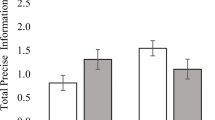Abstract
Five experiments tested the idea that instructing a witness to close their eyes during retrieval might increase retrieval success. In Experiment 1 participants watched a video, before a cued-recall test for which they were either instructed to close their eyes, or received no-instructions. Eye-closure led to an increase in correct cued-recall, with no increase in incorrect responses. Experiments 2–5 sought to test the generality of this effect over variations in study material (video or live interaction), test format (cued- or free-recall) and information modality (visual or auditory details recalled). Overall, eye-closure increased recall of both visual detail and auditory details, with no accompanying increase in recall of false details. Collectively, these data convincingly demonstrate the benefits of eye-closure as an aid to retrieval, and offer insight into why hypnosis, which usually involves eye-closure, may facilitate eyewitness recall.
Similar content being viewed by others
References
Barber, T. X. (1969). Hypnosis: A scientific approach. New York: Van Nostrand.
Bond, C. F., & Titus, L. J. (1983). Social facilitation: A meta-analysis of 241 studies. Psychological Bulletin, 94, 265–292.
Brooks, L. R. (1967). The suppression of visualization by reading. Quarterly Journal of Experimental Psychology, 19A, 289–299.
Clifford, B. R., & George, R. (1996). A field investigation of training in three methods of witness/victim investigative interviewing. Psychology, Crime and Law, 2, 231–248.
Dinges, D. F., Whitehouse, W. G., Orne, E. C., Powell, E. W., Orne, M. T., & Erdelyi, M. H. (1992). Evaluating hypnotic memory enhancement (hypermnesia and reminiscence) using multitrial forced recall. Journal of Experimental Psychology: Learning, Memory and Cognition, 18, 1139–1147.
Dywan, J., & Bowers, K. (1983). The use of hypnosis to enhance recall. Science, 22, 184–185.
Erdelyi, M. W. (1994). The empty set of hypermnesia. International Journal of Clinical and Experimental Hypnosis, 42, 379–390.
Fisher, R. P., & Geiselman, R. E. (1992). Memory enhancing techniques for investigative interviewing: The cognitive interview. Springfield, IL: C. C. Thomas.
Geiselman, R. E., Fisher, R. P., MacKinnon, D. P., & Holland, H. L. (1985). Eyewitness memory enhancement in the police interview: Cognitive retrieval mnemonics versus hypnosis. Journal of Applied Psychology, 70, 401–412.
Geiselman, R. E., Fisher, R. P., MacKinnon, D. P., & Holland, H. L. (1986). Enhancement of eyewitness memory with the cognitive interview. American Journal of Psychology, 99, 385–401.
Green, D. M., & Swets J. A. (1966) Signal detection theory and psychophysics. New York: Wiley.
Hibbard, W. S., & Worring, R. W. (1981). Forensic hypnosis: The practical application of hypnosis in criminal investigation. Springfield, IL: C.C. Thomas.
Kebbell, M. R., & Wagstaff, G. F. (1999). The effectiveness of the cognitive interview. In D. Canter &L. Allison (Eds.), Interviewing and deception (pp. 25–39). Aldershot: Ashgate Publishing.
Kebbell, M. R., Milne, R., & Wagstaff, G. F. (1999). The cognitive interview: a survey of its forensic effectiveness. Psychology, Crime & Law, 5, 101–115.
Kleinhauz, M., Horowitz, I., & Tobin, Y. (1977). The use of hypnosis in police investigation: a preliminary communication. Journal of the Forensic Science Society, 17, 77–80.
Kohnken, G., Milne, R., Memon, A., & Bull, R. (1999). The cognitive interview: A meta-analysis. Psychology, Crime and Law, 5, 3–27.
Koriat, A., Goldsmith, M., & Pansky, A. (2000). Toward a psychology of memory accuracy. Annual Review of Psychology, 51, 481–537.
McConkey, K. M., & Sheehan, P. W. (1996). Hypnosis, memory, and behavior in criminal investigation. New York: Guilford.
Milne, R., & Bull, R. (2002). Back to basics: A componential analysis of the original cognitive interview mnemonics with three age groups. Applied Cognitive Psychology, 7, 743–755.
Moscovitch, M. (1994). Cognitive resources and dual-task interference effects at retrieval in normal people: The role of the frontal lobes and medial temporal cortex. Neuropsychology, 8, 524–534.
Scoboria, A., Mazzoni, G., Kirsch, I., & Milling, L. S. (2002). Immediate and persisting effects of misleading questions and hypnosis on memory reports. Journal of Experimental Psychology: Applied, 8, 26–32.
Troyer, A. K., Moscovitch, M., & Winocur, G. (1997). Clustering and switching as two components of verbal fluency: Evidence from younger and older healthy adults. Neuropsychology, 11, 138–146.
Wagstaff, G. F. (1982). Hypnosis and witness recall: A discussion paper. Journal of the Royal Society of Medicine, 75, 793–797.
Wagstaff, G. F. (1984). The enhancement of witness memory by hypnosis: A review and methodological critique of the experimental literature British Journal of Experimental and Clinical Hypnosis, 2, 3–12.
Wagstaff, G. F. (1999). Hypnotically elicited testimony. In A. Heaton- Armstrong, E. Shepherd, D. Wolchover (Eds.), Analysing witness testimony (pp. 277–310). London: Blackstone.
Wagstaff, G. F., Brunas-Wagstaff, J., Knapton, L., Winterbottom, J., Crean, V., Cole, J., & Wheatcroft, J. (2004). Facilitating memory with hypnosis, focused meditation and eye-closure. International Journal of Clinical and Experimental Hypnosis, 52, 434–455.
Weitzenhoffer, A. M., & Hilgard, E. R. (1959). Stanford hypnotic susceptibility scale, forms A and B. Palo Alto, CA: Consulting Psychologist Press.
Weitzenhoffer, A. M., & Hilgard, E. R. (1962). Stanford hypnotic susceptibility scale, form C. Palo Alto, CA: Consulting Psychologist Press.
Author information
Authors and Affiliations
Corresponding author
About this article
Cite this article
Perfect, T.J., Wagstaff, G.F., Moore, D. et al. How Can We Help Witnesses to Remember More? It’s an (Eyes) Open and Shut Case. Law Hum Behav 32, 314–324 (2008). https://doi.org/10.1007/s10979-007-9109-5
Received:
Accepted:
Published:
Issue Date:
DOI: https://doi.org/10.1007/s10979-007-9109-5




